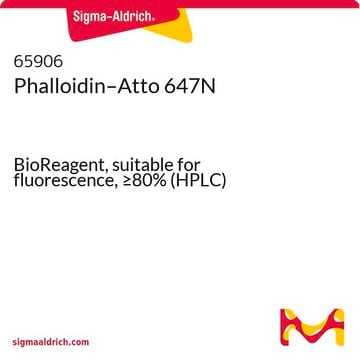07373
Phalloidin–Atto 740
BioReagent, suitable for fluorescence
Synonyma:
Atto 740–Phalloidin
Přihlásitk zobrazení cen stanovených pro organizaci a smluvních cen
About This Item
UNSPSC Code:
12352108
NACRES:
NA.32
Doporučené produkty
product line
BioReagent
assay
≥90.0% (HPLC)
form
powder
manufacturer/tradename
ATTO-TEC GmbH
transmittance
254 nm
740 nm
fluorescence
λex 750 nm; λem 764 nm in 0.1 M phosphate pH 7.0
UV absorption
λ: 739 -745 nm Amax
suitability
suitable for fluorescence
storage temp.
−20°C
General description
Atto 740 belongs to a new generation of fluorescent labels for the near infrared spectral region. The dye is designed for application in the area of life science, e.g. labeling of DNA, RNA or proteins. Characteristic features of the dye are strong absorption and good fluorescence as well as excellent thermal and photo-stability. Atto 740 is a cationic dye. After coupling to a substrate the dye carries a net electrical charge of +1.
Atto 740 is a pH sensitive product. While practically stable up to pH 7.4 (PBS-buffer), it slowly degrades at higher pH. If exposed to higher pH for coupling purposes, we recommend reducing the pH immediately after completion of the reaction.
Phalloidin is a fungal toxin isolated from the poisonous mushroom Amanita phalloides. Its toxicity is attributed to the ability to bind F actin in liver and muscle cells. As a result of binding phalloidin, actin filaments become strongly stabilized. Phalloidin has been found to bind only to polymeric and oligomeric forms of actin, and not to monomeric actin. The dissociation constant of the actin-phalloidin complex has been determined to be on the order of 3 x 10-8. Phalloidin differs from amanitin in rapidity of action; at high dose levels, death of mice or rats occurs within 1 or 2 hours. Fluorescent conjugates of phalloidin are used to label actin filaments for histological applications. Some structural features of phalloidin are required for the binding to actin. However, the side chain of amino acid 7 (g-d-dihydroxyleucine) is accessible for chemical modifications without appreciable loss of affinity for actin.
find more information here
Atto 740 is a pH sensitive product. While practically stable up to pH 7.4 (PBS-buffer), it slowly degrades at higher pH. If exposed to higher pH for coupling purposes, we recommend reducing the pH immediately after completion of the reaction.
Phalloidin is a fungal toxin isolated from the poisonous mushroom Amanita phalloides. Its toxicity is attributed to the ability to bind F actin in liver and muscle cells. As a result of binding phalloidin, actin filaments become strongly stabilized. Phalloidin has been found to bind only to polymeric and oligomeric forms of actin, and not to monomeric actin. The dissociation constant of the actin-phalloidin complex has been determined to be on the order of 3 x 10-8. Phalloidin differs from amanitin in rapidity of action; at high dose levels, death of mice or rats occurs within 1 or 2 hours. Fluorescent conjugates of phalloidin are used to label actin filaments for histological applications. Some structural features of phalloidin are required for the binding to actin. However, the side chain of amino acid 7 (g-d-dihydroxyleucine) is accessible for chemical modifications without appreciable loss of affinity for actin.
find more information here
Packaging
Bottomless glass bottle. Contents are inside inserted fused cone.
Legal Information
This product is for Research use only. In case of intended commercialization, please contact the IP-holder (ATTO-TEC GmbH, Germany) for licensing.
Storage Class
11 - Combustible Solids
wgk_germany
WGK 3
flash_point_f
Not applicable
flash_point_c
Not applicable
Osvědčení o analýze (COA)
Vyhledejte osvědčení Osvědčení o analýze (COA) zadáním čísla šarže/dávky těchto produktů. Čísla šarže a dávky lze nalézt na štítku produktu za slovy „Lot“ nebo „Batch“.
Již tento produkt vlastníte?
Dokumenty související s produkty, které jste v minulosti zakoupili, byly za účelem usnadnění shromážděny ve vaší Knihovně dokumentů.
Náš tým vědeckých pracovníků má zkušenosti ve všech oblastech výzkumu, včetně přírodních věd, materiálových věd, chemické syntézy, chromatografie, analytiky a mnoha dalších..
Obraťte se na technický servis.






